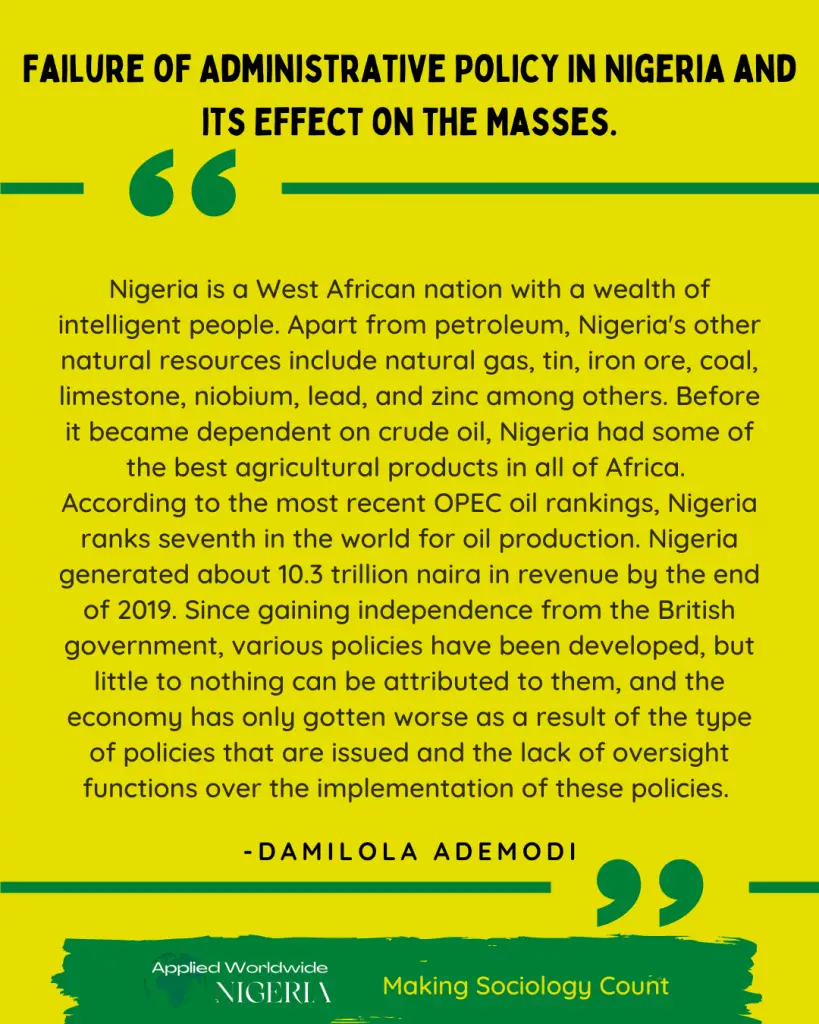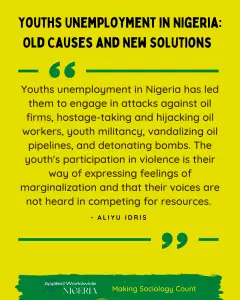Nigeria is a West African nation with a wealth of intelligent people. Apart from petroleum, Nigeria’s other natural resources include natural gas, tin, iron ore, coal, limestone, niobium, lead, and zinc among others. Before it became dependent on crude oil, Nigeria had some of the best agricultural products in all of Africa. Due to the failure of administrative policy in Nigeria, this seems to be changing.
According to the most recent OPEC oil rankings, Nigeria ranks seventh in the world for oil production. Nigeria generated about 10.3 trillion Naira in revenue by the end of 2019. Since gaining independence from the British government, various policies have been developed, but little to nothing can be attributed to them, and the economy has only gotten worse as a result of the type of policies that are issued and the lack of oversight functions over the implementation of these policies.

The socioeconomic, educational, and political facets of the country have been affected by these decisions, bringing underlying critical problems and underdevelopment. However, the question at hand is: Why do government administrative policies in Nigeria fail?
First, we should look at what administration is, why it’s important, and how its shortcomings in policy-making and implementation can pose a serious obstacle to Nigeria’s development.
What is Administration?
Adebayo (1992) defines administration as the process of organizing and directing human and material resources toward the attainment of organizational goals. It must exist in any organization for a defined objective because each one consists of human beings brought together in a hierarchical setup, making use of tools, equipment, and both human and material resources to achieve the objectives for which the organization is established.
That is, administration exists in any governmental setting with the simple goal of planning and executing governmental policies to better the lives of the citizens. The administration is the fulfillment or enforcement of public policy as declared by the competent authorities. Lennon (2009) opined that policy is recognized as a plan or course of action by a government, political party, or business designed to influence and determine decisions, actions, and other matters.
More Explanation on Administration
Murphy, Mufti, and Kassem (2008) ascertain that a sound understanding of policy processes is important, especially for those with an interest in the development of societal educational policies. Policies are designed to bring to life the perspectives, realities, and tools for negotiating the political order of education, and economy and to improve welfare systems in a changing society. A policy can be seen as a deliberate plan of action to guide decisions and achieve rational outcomes for the institution involved.
Before the 1842 arrival of the first European settlers, the history of administration in what is now known as Nigeria dates back centuries. As noted by Balogun(1983) there existed a system of traditional administration in different communities then. Among these features are the ritualistic, extra-terrestrial pull, moralistic orientation, authoritarian tendencies, and consanguinity factor.
These features represented the socially and politically acceptable standards and procedures for administering and carrying out the regulations of public policies. There are hierarchies and methods for reprimanding offenders and eliminating corrupt behavior that may be impeding the implementation of any policy at the time.
Nigeria after Independence
When Nigeria gained independence, it assimilated the British colonial government’s administrative structure. A formal bureaucratic system was created with three important tiers: the executive, legislature, and judiciary. Each tier is responsible for formulating, maintaining, and implementing policies in the newly born country. To ensure the swift creation and implementation of policies made by these tiers, several bodies were created to assist them at the federal and state level.
According to Ikelegbe (1996), these bodies include Governmental Actors – the Legislative; the Executive; the Judiciary; and the Civil service Non-Governmental Actors – Political Parties; Pressure/Interest Group; Mass Media, the Citizens among others. These bodies coupled together play a vital role in policy-making and implementation in the country by creating solutions to the problems that may be otherwise facing the masses. Understanding administration in the Nigerian context refers to all the organizations that exist as part of the government mechanism to implement public decisions and deliver services that are valuable to citizens.
Failure of Administrative Policy In Nigeria.
Suleiman (2009) identified the civil service as a component of the public sector in Nigeria. Therefore, the civil service is one of the agents of development in any nation. The transformation of any society or system depends on the effectiveness and efficiency of its civil service, and this is particularly the case in developing countries (Lawal & Oluwatoyin, 2011).
However, despite their adoption and involvement in these various structures, the administration’s implementation process in Nigeria has been hit or miss. Sensible policies and effective governance have been replaced with ineffective policies that do not adequately benefit the nation’s citizens. A variety of things cause these issues and inefficiencies, including:
- Lack of systematic planning.
- Implementation gap–that is a widening distance between the stated policy goals and the realization of such planned goals.
- Lack of apathy by policymakers.
- Inadequate collaborative policymaking (underestimation of the delivery challenges).
- Political vagaries and disagreement among government officials.
- Ethnic bigotry.
- Religion.
- Lack of thoroughness in policy execution.
- White elephant or unrealistic policy goals and a lack of clarity in policy definition.
Corruption in Nigeria
Corruption, and a lack of accountability on the part of government officials. These elements have combined to hinder the nation’s efforts to reach its full potential among other countries on the continent and around the world. And until reforms are made, its national aspirations will continue to be compromised. The country’s administrative policy structure has not improved nor changed despite the numerous reform initiatives and conventions.
Examples of these failed policies are The NEEDS Programme (2004), The 7th Point Agenda, Operation Feed the Nation (OFN) in 1976, Family Economic Advancement Programme (FEAP), among others. Every sector of our national lives has either been ruined by government actions or, its potential has never been fully tapped. The results of this are mass unemployment among youths, extreme poverty, underdevelopment, less patriotism by citizens, wasting of resources and government funds, poor security, and protection of citizens, erratic power supplies, poor educational system, and unfavorable economic conditions for the people.
Leaders are more concerned with what matters to them than what matters to the Nigerian state and citizens. However, according to (Barrett, 2005) the process of translating policy into actions often attracts greater attention because translation has been reported to lag behind policy expectations. This necessitated the need to put forward theoretical frameworks and evaluations to ensure that policies are translated and executed as accurately as possible (Hyndman, Benson,& Telford, 2014).
Solutions to the Failure of Administrative Policy In Nigeria
The solution here is a special review of government policies and previous actions that have been taken in the administrative system. Before policies are enacted, citizens should be given a hearing on the policies before implementation. In a democratic environment, the state operates to ensure the general welfare of its people. Therefore, the state is a natural design for promoting social good and public welfare (Okoli, 1990).
That is, the government should seek the opinions of the masses before engaging in a particular decision of the majority. An example of this rash decision can be found in the cryptocurrency ban by the Buhari administration in 2021. Secondly, there should be a developed policy support program. Are they enforcing the policies the way they should? Because achieving the desired goal of any public intention is the hallmark of policy realization.
Thirdly, there should be an implementation review of public policy by developing and improving measurement and evaluation mechanisms. Fourthly, there should be interaction and communication between the Government and the other organizations involved in policy-making. And crucially, the Culture of Continuity must be encouraged among policymakers. That is public projects shouldn’t be abandoned halfway through as this is always the norm among government officials in the country.
Final Thoughts on the Failure of Administrative Policy in Nigeria
The bad news is that Nigeria is gradually returning to a state of nature where chaos reigns and order is lost. This is evident from the research; Nigerians are now left to fend for their needs without expecting any tangible return from the government. According to the research, Nigerians are now left to take care of their own needs without looking to the government for any concrete benefits. People are left at the mercy of private hospitals and clinics with sometimes half-baked personnel.
In Nigeria, tertiary education has no specific graduation year. The few that can afford it take their children and wards to private institutions, while the greater majority suffer erratic administrative failures in different institutions across the country e.g, the case of ASUU and the federal government. Unemployment and a lack of government assistance programs for youth are widespread. Important roads are neglected while attention is paid to less trivial issues. Another critical issue is the ongoing new note tumult in the country, the idea of a new note itself isn’t bad but the commission policy is shabby at best.
Conclusively, it is pertinent to note that, government actions or inactions require legal backing. The best way to ensure the proper administration of the country is by first ensuring constitutional backing. That is everything must be done according to the constitution and reforms are to be made to any areas that need adjustment.
References for this Article on the Failure of Administrative Policy in Nigeria
(Hyndman, Benson,& Telford, 2014). Journal of Education & Social Policy Vol. 2, No. 5; November 2015 59
Adebayo, A. (1981). Principles and Practice of Public Administration in Nigeria. Ibadan: Spectrum Books Limited.
Balogun, M.J. (1983). Public Administration in Nigeria–A Developmental Approach. London: Macmillan Press Ltd.
Ikelegbe, A.O. 1994. Public Policy Making and Analysis. Benin City: Uri Publishing Ltd.
Barrett, S. and Fudge, C. (1981). Examining the policy-action relationship in Barrett, S. and Fudge, C. (eds). Policy and action: essays on the implementation of public policy. London and New York.
Lennon, S. (2009). Educational policy. From http://www.lennonportal.net/index_file/policy
Lawal, T. & Oluwatoyin, A. (2011). National development in Nigeria: Issues, challenges and prospects. Journal of Public Administration and Policy Research, 3(9), 237–241




